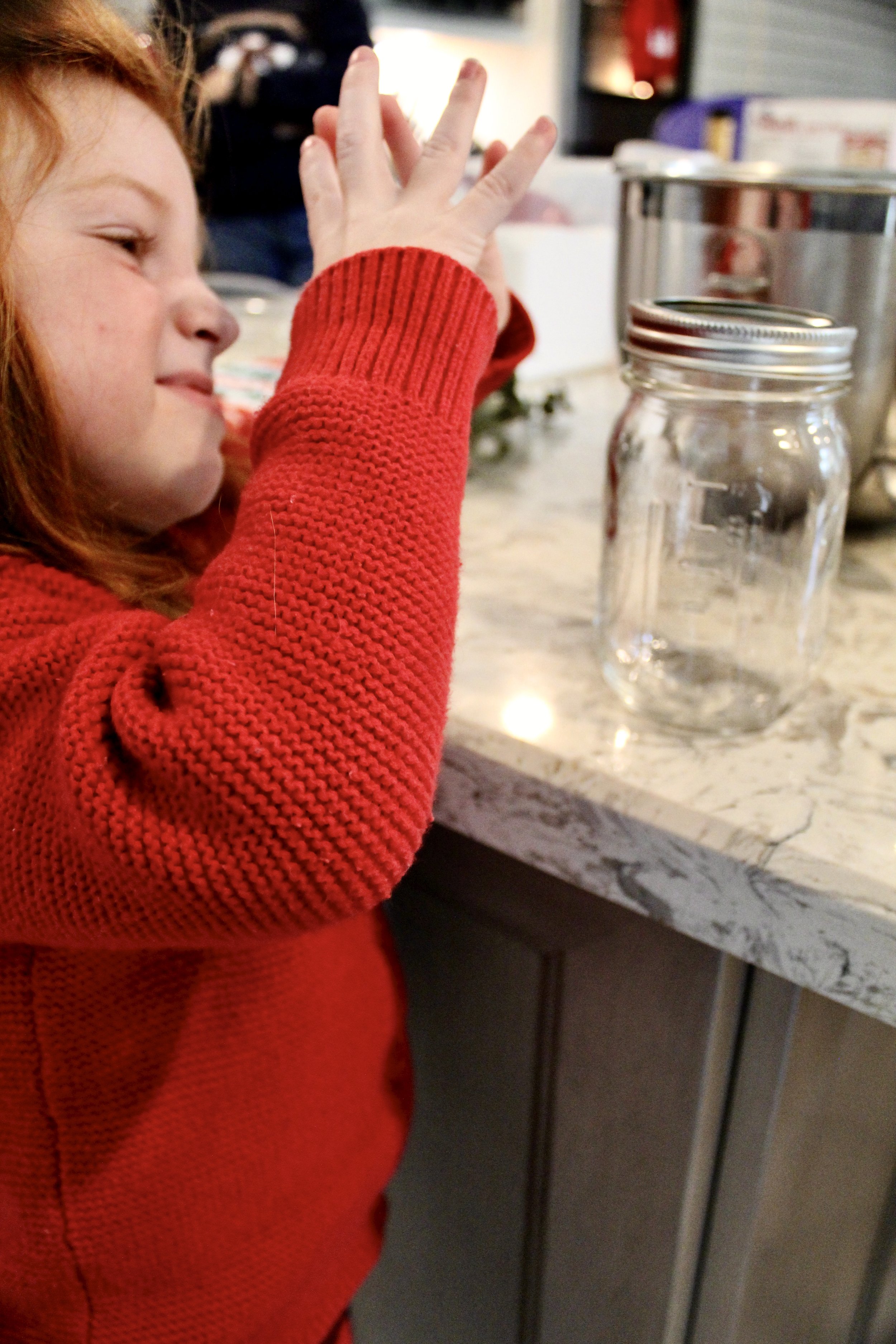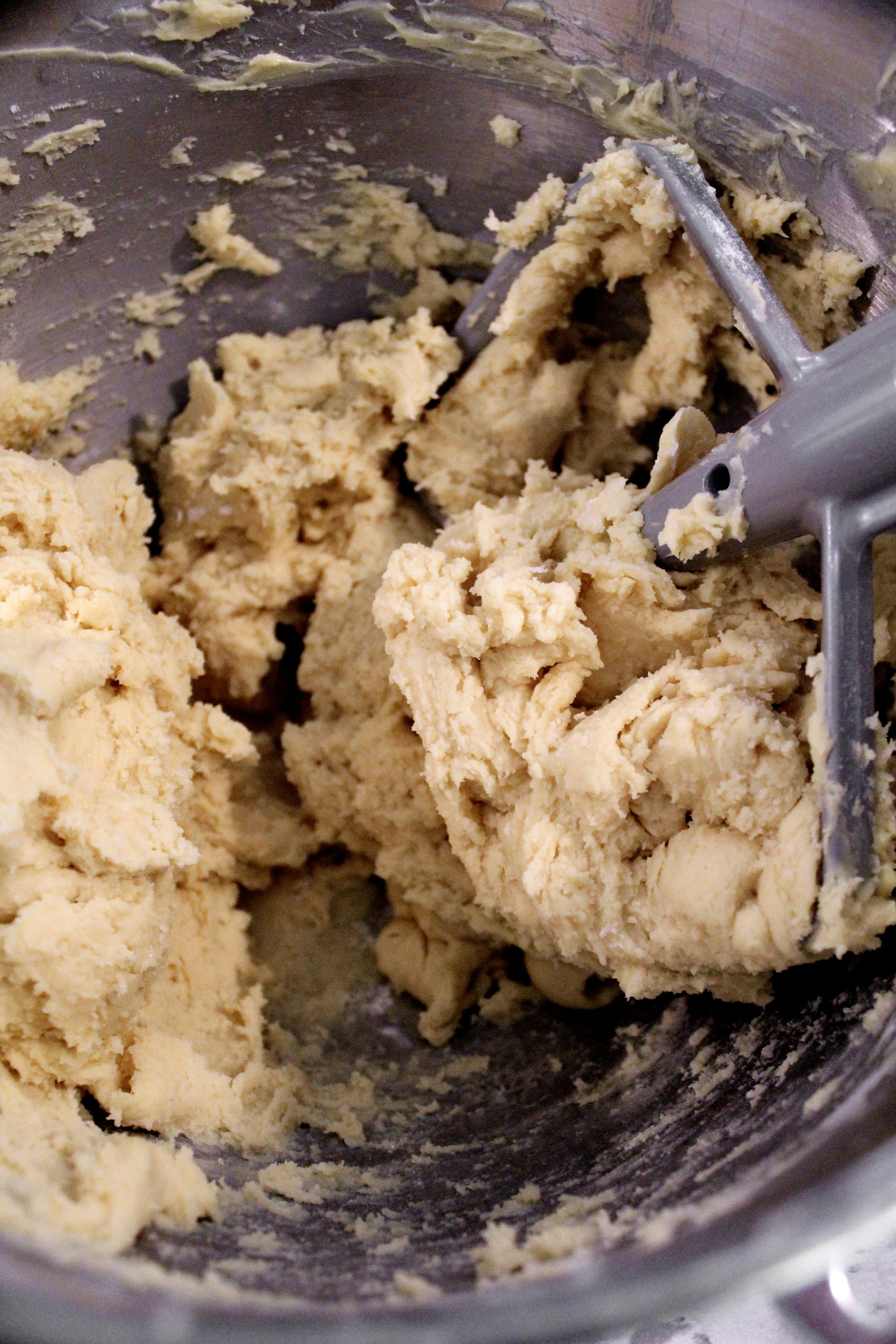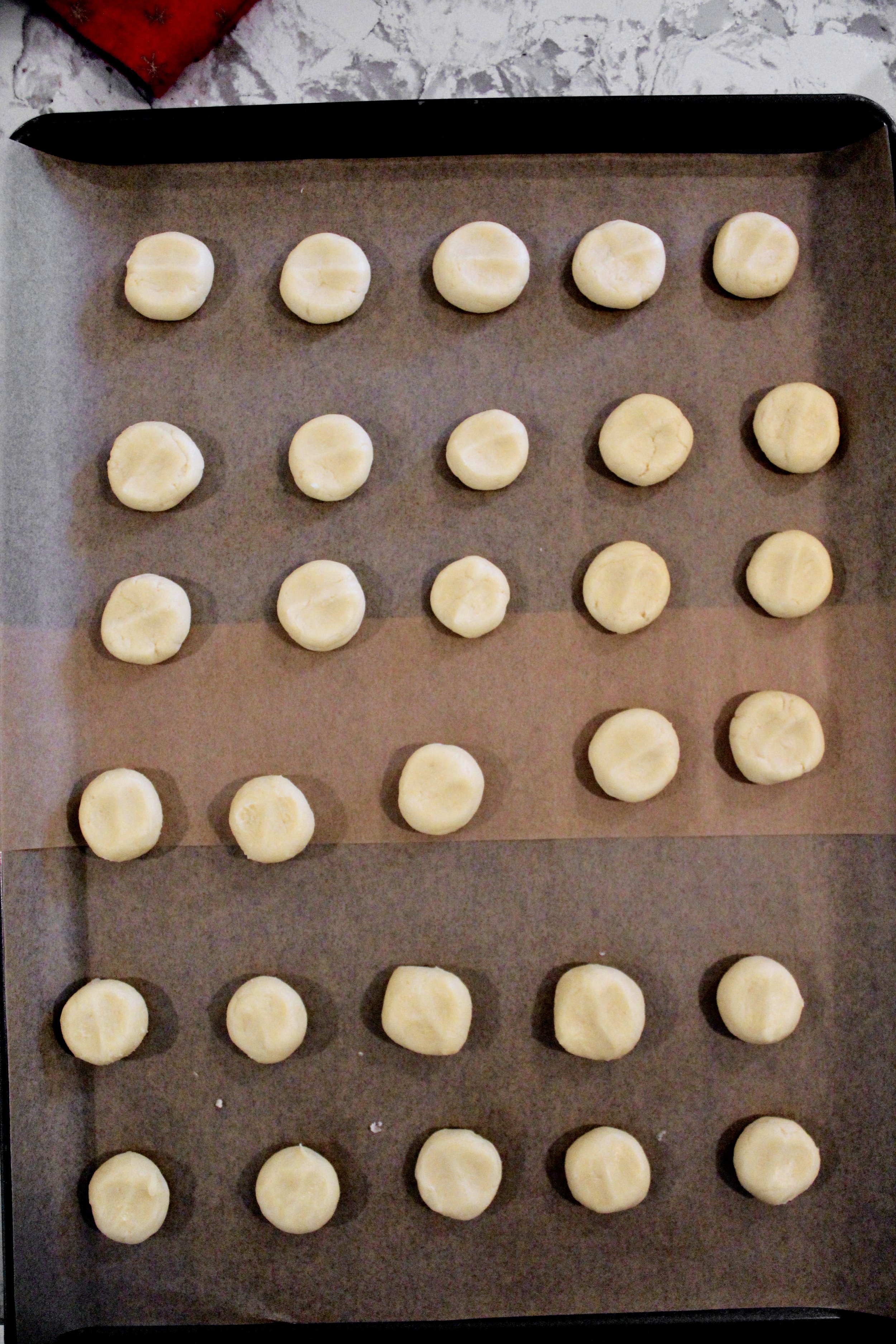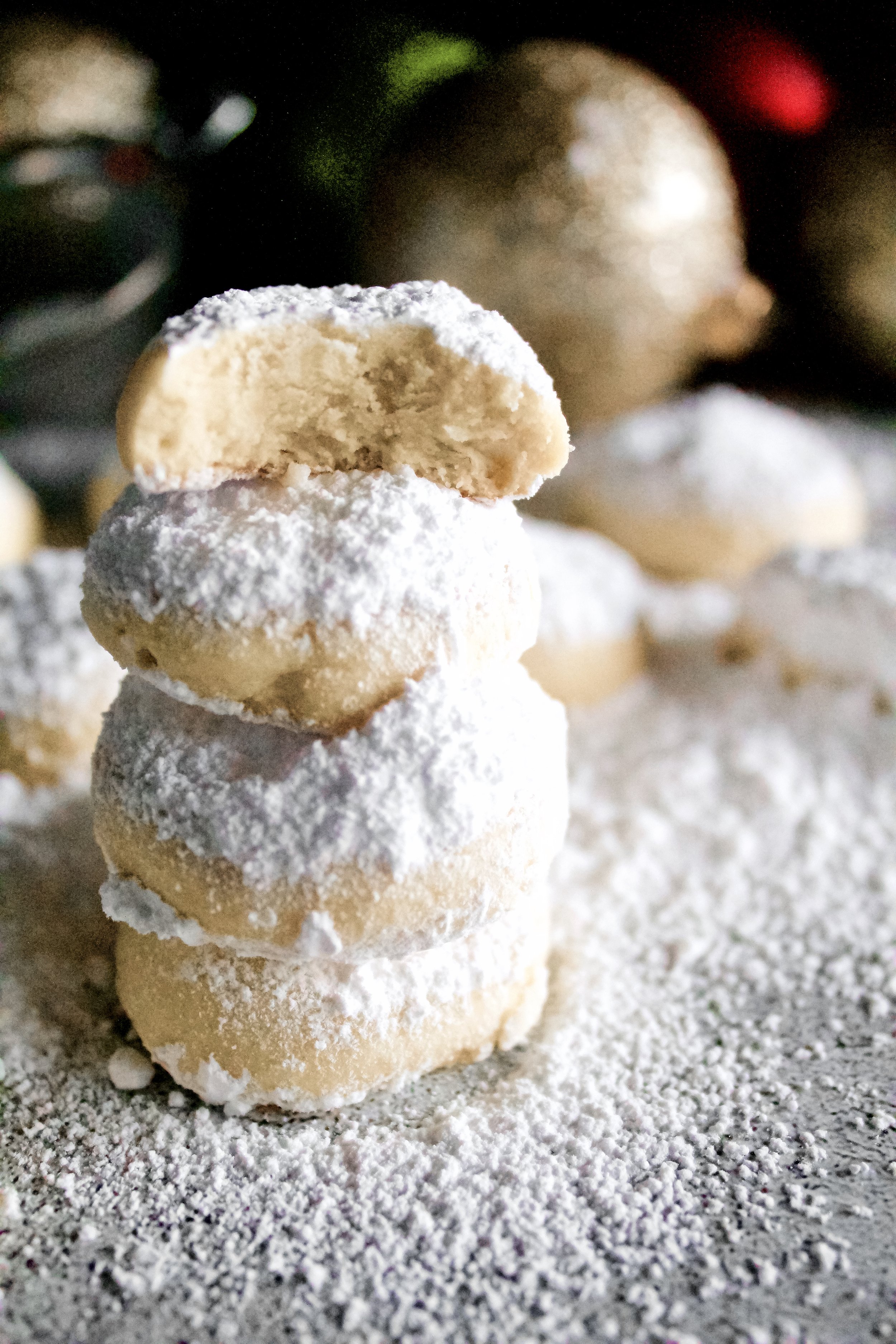Kourabiethes (Greek Christmas Cookies)
A family twist on the classic Greek Christmas cookie, these tender shortbread cookies have a hint of cognac and a snowy dusting of powdered sugar. They’re bite sized so you can keep coming back for more!
This post may contain affiliate links from which, at no additional cost to you, I may earn a small commission to keep this site running. Only products I myself would or do use are recommended.
Okay, first, any Greeks reading this may already be thinking: where are the nuts??? These are my husband’s family’s twist on the classic kourabiethes, which are similar to a Mexican wedding cookie. They leave out the nuts and have more of a cognac tang to them. But man are they good!
For this recipe, I collaborated with our cousin, the talented Lizz from Cook Like a Greek, to make some Christmas cookies and just catch up. It was so fun! And my daughter loved helping us roll out the cookies…until she got bored and went to play with her train. It was a very Greek, family-oriented day and the perfect way to kick off the Christmas season.
Why this recipe works
The cookie base here is basically a shortbread cookie, and I was surprised to see how similar to my own shortbread it was. The use of cake flour makes for a very tender cookie, while the egg yolk helps bind it all together. The cognac (along with the cake flour, to an extent) adds a subtle tang, which is balanced out by the dusting of powdered sugar. In fact, we learned a new trick this time, making the cookies with the talented Lizz from Cook Like a Greek: sprinkle powdered sugar on your work surface so the cookies get it on top and and on bottom! It was such a genius idea and made these even better!
Key ingredients
Salted butter. The salt is just enough to help these along, but if you don’t have salted butter, add 1 teaspoon salt to the recipe.
Powdered sugar. This gives the delicate crumb as well as the festive dusting on top!
Egg yolk. Just enough to bind the ingredients without creating rise or chew.
Vanilla extract. I added extra, because why not?
Cognac or brandy. Either will work, and you can replace this with a little extra vanilla.
Cake flour. If you can’t find any, make your own by adding 2 tablespoons of cornstarch into your 1 cup measuring cup then spooning more all purpose flour on top, leveling it off with the back of a knife. Sift this well before using (I suggest sifting it, one cup at a time, into the batter, since you already are adding cake flour one cup at a time).
How to make kourabiethes
1. Cream the butter until very light and fluffy. Be sure to mix on high.
2. One at a time, mix in the powdered sugar, egg yolk, vanilla, and cognac. Mix on high again, and mix well after each addition, about 30-60 seconds.
3. Add in the cake flour, one cup at a time. Mix on low after each addition, until all flour is mixed in.
4. Add cake flour just until the dough comes together and can be easily rolled into a ball. After 5 cups, stop and pinch of a bit of dough and see how easily it rolls. Keep adding flour, now in 1/4 cup amounts, until it rolls easily. You likely will need about 5 1/2 cups.
5. Roll about 1 tablespoon or so of dough into a ball, then press down on the baking tray. The smaller the cookies are, the easier they are to eat with all that powdered sugar.
6. Bake until matte in appearance and the edges begin to turn a little golden (not too dark). Since the baking time can vary, be sure to check them a little early.
7. Dust a clean work surface with powdered sugar then place the still-hot cookies on top. Do this as soon as the cookies come out of the oven. You only want to let them cool on the tray a few minutes, up to 5.
8. Sprinkle with more powdered sugar. Be liberal with this! You can also place them in cupcake liners for storage (it keeps the powdered sugar under control) and add a little more sugar so they stay fresh and sweet!
Enjoy!
Tips and FAQ’s for this recipe
Can kids or expectant mothers eat these?
This is more of a personal choice. There is less than a shot of alcohol in the entire batch, which makes around 60 cookies, give or take. So, unless you eat the whole batch, you’ll be getting about the same amount of alcohol in kombucha, which doesn’t require an ID to purchase. However, I am not a doctor, so please do what you feel most comfortable with. You can add in an extra tablespoon of vanilla in place of the cognac, if you prefer.
Do I have to use cognac?
No! Cognac is what the original recipe we have calls for, and I’m pretty sure that’s the only thing it gets used for at my in-laws’ house. You can use brandy or another similar liqueur. Or, you can replace the 2 tablespoons cognac with up to one extra tablespoon of vanilla (since three total tablespoons would be way too much).
What if I don’t have cake flour?
That’s okay! Some recipes call for plain flour or even pastry flour, but I suggest doing the cake flour alternative. You simply add 2 tablespoons of cornstarch to your 1 cup measuring cup before spooning regular flour on top of it to equal 1 full cup. Be sure to spoon in the flour and level it off with a knife, so that you don’t accidentally pack it in. You can make this mixture one cup at a time, sifting it into the mixer as you add each cup (to mix it up and remove clumps) or you can create a big batch of cake flour in a separate bowl, sifting it all together a few times so it’s well-mixed.
My cookie tools
Here are my must-have tools I use for making these cookies. Affiliate links provided.
Baking mat or parchment paper (for baking)
Pastry mat or parchment paper (for dusting with sugar)
Cupcake liners (for storing the cookies—keeps the powdered sugar under control)
Kourabiethes (Greek Christmas Cookies)
- prep time: 10-15 minutes
- bake time: 15-20 minutes
- total time: 35 minutes
yields: about 60 cookies
Ingredients:
- 1 pound (454g) salted European style butter, softened
- 1 cup (130g) powdered/icing sugar, plus 1-2 cups extra for dusting
- 1 large egg yolk, room temperature
- 1 tablespoon (13g) pure vanilla extract
- 2 tablespoons (26g) cognac or brandy
- 5 ½ cups (638g) cake flour*
- optional: cupcake liners (for storing each cookie)
Instructions:
- Preheat oven to 350. Line two cookie sheets with silicone mats or parchment.
- Cream the butter in the bowl of your stand mixer fitted with the paddle attachment or in a large mixing bowl with a handheld mixer. Beat on high until light and fluffy, 1-2 minutes.
- One at a time, add the powdered sugar, egg yolk, vanilla, and cognac, beating well after each addition.
- Add flour one cup at a time, beating on low until combined after each addition. After 5 cups, stop and check if the dough can be handled easily by pinching off a grape sized amount and trying to roll it between your hands. If it sticks or will not roll into a ball easily, continue adding flour ¼ cup at a time until the dough can be handled easily. Check after each ¼ cup addition.
- Roll about 1 to 1 ½ tablespoons of dough (about the size of a gumball) into a ball. Place on the mat and press down gently with two fingers, until about 1 to 1 ½ inches in diameter.
- Bake for 15-20 minutes, until the cookies are matte in appearance and the edges begin to turn lightly golden (not dark). Let cool on the pan just for a few minutes.
- While the cookies cool, dust a clean surface, parchment, or pastry mat with powdered sugar, using a small mesh sieve or sifter.
- Remove the cookies to the powdered sugar (set them right on top, still warm). Dust the top of the cookies well with more powdered sugar. Don’t skimp here!
- Optional: place cookies in cupcake liners, to keep the powdered sugar from going everywhere, and dust with a little more sugar, for good measure.
Enjoy!
Cookies should last, in an airtight container, for 1-2 weeks at room temperature.
*You may end up needing a little less or a little more cake flour (the original recipe from my Greek family calls for 5-6 cups). That’s why you add the cake flour 1 cup at a time, so you can stop at 5 cups or continue (in smaller amounts) to 6 cups, until you have a dough that can be rolled without sticking to your hands–but just barely.

















